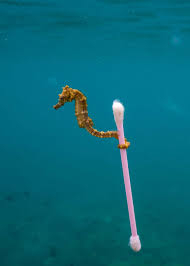Marine ecosystems are a vital part of our planet's biodiversity, providing habitats for a diverse range of species and playing a critical role in regulating the Earth's climate. However, human activities, such as plastic pollution and overfishing, are causing significant harm to these fragile ecosystems.
Plastic Pollution
Plastic pollution is one of the most significant environmental issues facing our oceans today. Every year, millions of tons of plastic waste enter the ocean, with devastating consequences for marine life. Plastic waste can entangle and suffocate marine animals, such as sea turtles, dolphins, and whales, causing them to suffer and die. It can also be mistaken for food and ingested by marine animals, leading to internal injuries, malnutrition, and starvation.
The impact of plastic pollution on marine ecosystems goes beyond harming individual animals. As plastic waste breaks down into smaller pieces, it can be consumed by plankton and other small marine organisms, entering the food chain. This can have a ripple effect, as larger animals, including fish and marine mammals, feed on these organisms, potentially exposing them to toxic chemicals and disrupting the entire food web.
Overfishing
Overfishing is another significant threat to marine ecosystems. The practice of catching fish faster than they can reproduce is causing populations of many fish species to decline rapidly. This not only affects the fish themselves but can also have a profound impact on other species that depend on them for food, including marine mammals, seabirds, and larger fish.
Overfishing can also damage marine ecosystems by disrupting the delicate balance of predator-prey relationships. For example, the removal of large predatory fish, such as sharks, can lead to an increase in smaller fish populations, which can in turn cause a decline in other species that these smaller fish feed on.
Sustainable Fishing
To address the issue of overfishing, sustainable fishing practices are essential. These include measures such as setting catch limits, using selective fishing gear to reduce bycatch, and implementing marine protected areas to allow fish populations to recover. By adopting these practices, we can help ensure that fish populations are healthy and thriving for years to come.
Conservation
Conservation efforts are also critical to protecting marine ecosystems. This includes initiatives such as beach cleanups and reducing plastic use to prevent plastic pollution from entering the ocean. It also involves creating marine protected areas, where fishing and other activities are restricted to allow marine ecosystems to recover and thrive.
We can all play a role in marine conservation. By making small changes in our daily lives, such as reducing our plastic use and supporting sustainable fishing practices, we can help protect our oceans and the animals that call them home.
In conclusion, the devastating impact of plastic pollution and overfishing on marine ecosystems cannot be overstated. We must take urgent action to address these issues and protect the health and biodiversity of our oceans. By working together, we can make a positive difference and ensure a sustainable future for our planet.
